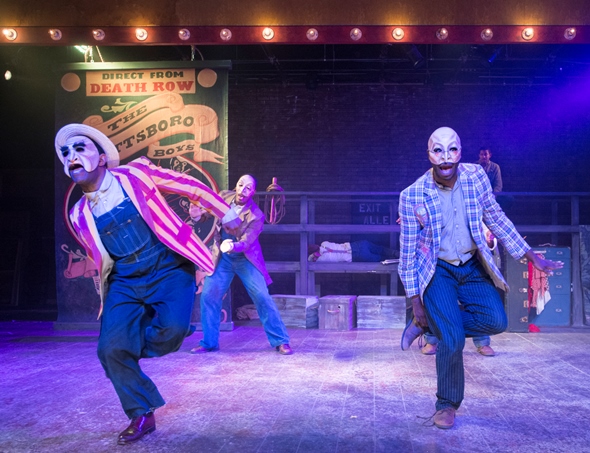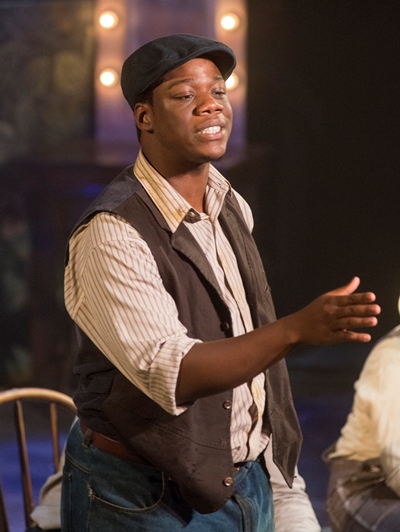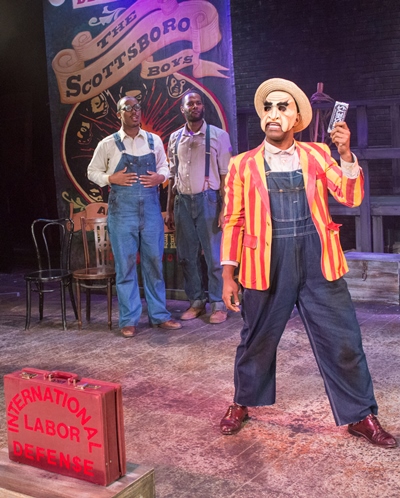‘The Scottsboro Boys’ at Raven: Wit, pathos and a vaudeville of justice for nine black kids
 Review: “Direct From Death Row: The Scottsboro Boys (An Evening of Vaudeville and Sorrow)” by Mark Stein, music and lyrics by Harley White, Jr. At Raven Theatre through Aug. 27. ★★★★★
Review: “Direct From Death Row: The Scottsboro Boys (An Evening of Vaudeville and Sorrow)” by Mark Stein, music and lyrics by Harley White, Jr. At Raven Theatre through Aug. 27. ★★★★★
By Lawrence B. Johnson
With any luck, Raven Theatre will elect to have yet a third go, and soon, at Mark Stein’s remarkable play-with-music “Direct From Death Row: The Scottsboro Boys (An Evening of Vaudeville and Sorrow).” Count me in — for the third time.
This brilliant and heartbreaking show, way out of the box and very funny, based on one of the most deplorable episodes in American social history, winds down its second run in consecutive seasons Aug. 27 at Raven. It’s must see theater, but more than that: If you see it once, chances are you’ll want nothing more than to take it from the top and revel again in its mesmerizing mix of mordant wit and wry pain.
 All nine of the Scottsboro boys, as they came to be known in this historical incident, are dead when the play begins. We meet them at roughly the ages they were when the whole ugly business started in Scottsboro, Ala., in 1931. They are all African-Americans, together again, remembering how it went down, re-enacting scene upon scene in masked parts as lawyers, prosecutor, jurists and witnesses while the years of their long incarceration and many trials roll by.
All nine of the Scottsboro boys, as they came to be known in this historical incident, are dead when the play begins. We meet them at roughly the ages they were when the whole ugly business started in Scottsboro, Ala., in 1931. They are all African-Americans, together again, remembering how it went down, re-enacting scene upon scene in masked parts as lawyers, prosecutor, jurists and witnesses while the years of their long incarceration and many trials roll by.
It was the Depression, and the boys – who mostly didn’t know each other – were hoboing on a freight train bound from Chattanooga to Memphis when they got into a fight with some white boys who were also riding the rails. At the station in Paint Rock, Ala., the black kids were pulled off the train and arrested for assault – and rape, on the allegations of two white women hoboing on the same train. The latter charge was a capital offense in that time and place.
The incident swelled into a cause célèbre when it caught the attention of the NAACP and the American Communist International Labor Defense. When both organizations jumped in provide legal assistance, the stage was set for a protracted run of courtroom battles that pitted Southern white culture against the will – and interests – of outside legal experts.
 It was, by the reckoning of the nine lads now reliving those events, a farce of jurisprudence – a vaudeville show, if you like. And that is precisely how they reconstruct the arduous journey they traveled together, as their boyhood is taken from them and in its place is raised the ever-recurring specter of the gallows.
It was, by the reckoning of the nine lads now reliving those events, a farce of jurisprudence – a vaudeville show, if you like. And that is precisely how they reconstruct the arduous journey they traveled together, as their boyhood is taken from them and in its place is raised the ever-recurring specter of the gallows.
The main narrative falls to Haywood Patterson, played by Kevin Patterson with a chip-on-the-shoulder toughness that separates him from his fellows in peril. Explosive anger simmers in this man, but he caps it with patience and veils it with charm.
Watching this slyly transformative show within a show is much like observing a shell game: Your eye is pulled to one part of the stage by director-cum-master manipulator Michael Menendian when suddenly, as if by magic, one of the boys – ah, but which one? – pops into view in stylized mask and jacket as pompous prosecutor or debunking lawyer, or indeed as one of the finger-pointing girls (of dubious reputation).
Andrew Malone turns in a hilarious performance as the unwelcome Jewish defense lawyer Sam Leibowitz from New York, sashaying about the stage in choreographic accentuation of his slashing cross-examinations. But mostly his insights are smugly waved off by a judge (Tamarus Harvell) and prosecuting attorney (Semaj Miller) who dance around the annoying facts while telling a compliant jury (a trio of idiots in expressionless white masks) what it wants to hear.
 All that said, whenever Breon Arzell resurfaces in the guise of soft-shoeing, fast-talking Communist lawyer Joe Brodsky, he owns the show. Even in a company of very talented actors and marvelous characters, Arzell’s brashly confident Brodsky is irresistible and unforgettable.
All that said, whenever Breon Arzell resurfaces in the guise of soft-shoeing, fast-talking Communist lawyer Joe Brodsky, he owns the show. Even in a company of very talented actors and marvelous characters, Arzell’s brashly confident Brodsky is irresistible and unforgettable.
The three youngest of the boys are played by girls, with Anna Dauzvardis and Katrina D. Richard doubling as the shady, accusatory white girls on the train. They are, depending on how you look at it, delightful or mortifying: blasé, deceitful, oblivious.
Several supporting factors clinch this production’s all-around appeal and dramatic impact – Ray Toler’s efficient and adaptable set design, pianist Frederick Harris’ musical direction and onstage performance, the imaginative costumes by Sarah Jo White and Diane D. Fairchild’s subtle lighting. To say nothing of Kathleen Dennis’ saucy choreography.
Raven has no immediate plan for a third staging of “The Scottsboro Boys.” It’s a big show. But there’s time enough to plot a surprise summer reprise in 2017. I can see a lovely tradition taking shape here.
Related Links:
- Performance location, dates and times: Details at TheatreInChicago.com
- Raven Theatre’s 2016-17 season: Read about it here
Tags: Andrew Malone, Anna Dauzvardis, Breon Arzell, Diane D. Fairchild, Direct From Death Row: The Scottsboro Boys (An Evening of Vaudeville and Sorrow), Frederick Harris, Kat Dennis, Kathleen Dennis, Katrina D. Richard, Kevin Patterson, Michael Menendian, Raven Theatre. Mark Stein, Ray Toler, Sarah Jo White, Semaj Miller, Tamarus Harvell


